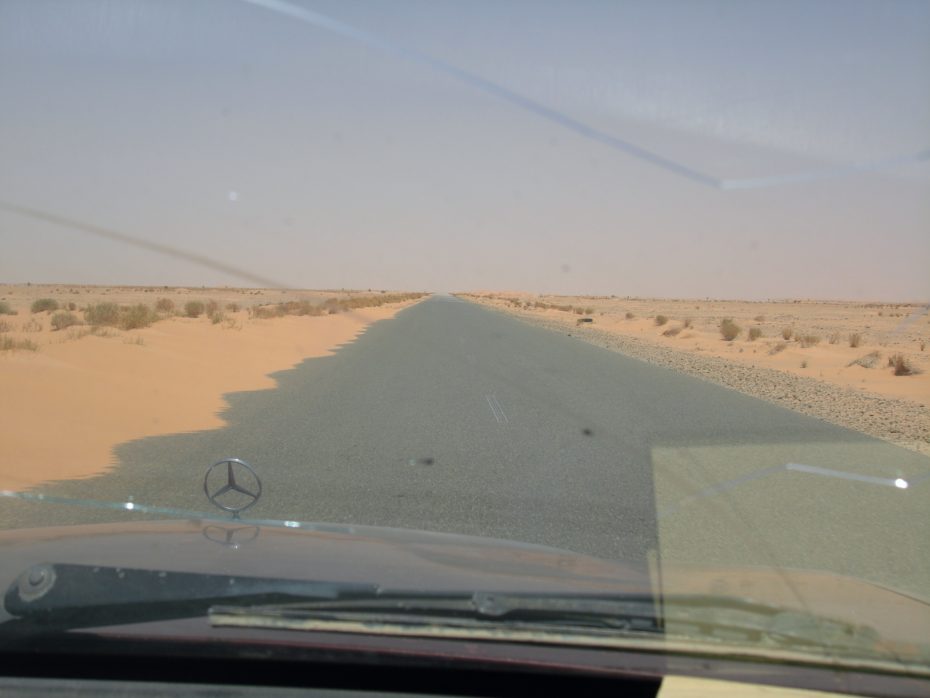Lets be honest, how many of you could point to Mauritania on the map? There is a distinct lack of Thomas Cook package tours to the country to boost its tourist profile and little sign of that changing. However, the welcome Steve and I received was in complete contrast to the UK and French government advice to travellers, which paints the country as a hotbed of Islamic terrorism where foreigners should tread every step with fear. Mauritania does indeed have some problems and the more remote areas are probably best avoided but compared to the indiscriminate attacks that have occurred on innocents in Morocco and Egypt, which remain major holiday destinations, the country is a positive haven of tranquility. Unlike the aforementioned Arabic countries where tourists are routinely subjected to all manner of harassments, you rarely get little more bother than the overcharging taxi drivers which blight every country in the world. If anyone has discovered a country where taxi drivers are not complete bastards to tourists, please let me know and I’ll be on the next plane out to make a pilgrimage to this shangri-la, where I shall worship its people with all due reverence.
Although I’d hesitate to use the description of negotiating the arrival in the country from the Senegalese border as any comparison to the national character it certainly provided a quirky insight into the bureaucracy of a state where military coups are sufficiently regular to be marked on all new calendars. The last one was a few months ago but they are regular enough to have little impact on day to day life. Or maybe it’s just that they have become part of everyday life.
After undergoing a transfer process involving 4 different people, excluding actual officials and a number of unspecified accomplices on the Senegalese side we set off from the southern river bank in a pirogue (traditional rowing boat) only to board a motorised one half way across, despite the fact I was enjoying the leisurely pace. On the north bank we were greeted by two Mauritanian officials and yet more unspecified accomplices. Ignoring attempts to lead us in contrary directions we stick with the officer holding our passports, albeit with his tendency to wander off to chat to locals. We were eventually brought before the station chief whose rotund figure was, in all likelihood, fed on the discrete payments of anxious border crossers. After the exceptionally languid perusal of passports, beloved of all officials as a silent means of confirming their authority, he added a wearisome signature to our visas. Whereupon we waited in a corridor with a goat seemingly unaware of the sparse grazing opportunities, whilst our documents are shuffled between more officials for about 15 minutes, before finally administering the required stamp. We were then led by the original official and unspecified accomplices to a shack where we, “have to change money” at the derisory rate typical at frontiers, in order to pay the appropriate backhander to the official and a commission to the head unspecified accomplice. The payments were hardly onerous so it’s hard to see how the fleet of unofficial hangers on that suddenly appear at every transport hub and frontier ever make a living. And thus we are ushered into our dilapidated taxi with the usual array of starting quirks and failing mechanics to trundle our way to the capital Nouakchott.
Mercedez seem to be the taxi of choice here but hardly maintained in the sort of condition you would be accustomed to. The packing arrangements of passengers is similarly unconventional by European standards though typical of the region, on one 6 hour journey we had 4 plus a baby in the back, two of us in the single passenger seat, though the driver did allow a whole seat to himself. Forced into stress positions in a sweltering metal box full of Arabs did have a hint of Guantanamo Bay on wheels about it. Thankfully Mauritanian hospitality is the polar opposite to that of the US military.






Interesting: so the political instability is such that it’s become a kind of stability.
I have to go here! Would you say the Senegal border is the best way in?
As always with such countries make sure you check up to date travel advice. From the South I reckon its best to stick to the border I went through near the coast due to the fallout from the Mali which has definite potential for problems further East. The general turned president is still in power since I was there but I wouldnt take anything for granted in the long term. Keep an eye on Thorn Tree forum or post a question on it if you are thinking of going as its usually a good source of info. Happy travels